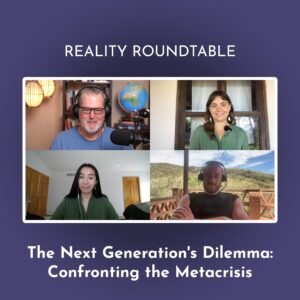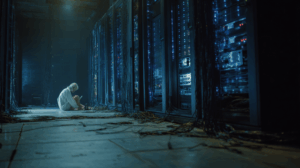
Show Summary
As the human predicament continues to accelerate, the conversations regarding the future are still dominated by older generations – yet it is their younger successors who will face the brunt of these issues throughout their lives. Today’s Reality Roundtable with Priscilla Trịnh, James Branagan, and Natasha Linhart, focuses on Generation Z’s perspective of the metacrisis, how learning the reality of the human predicament has affected their worldview, and what they see as viable future paths for themselves and the world. How might we approach intergenerational relationships to encourage the transfer of knowledge in both directions, without blame or resentment? What are the unique challenges that young people face when addressing the layers of complexity and risk in the world, and thinking about how to respond? Could fostering community, empathy, and personal responsibility act as a bridge across generational divides, steering us towards a more unified and compassionate future?
About Priscilla Trịnh
Priscilla Trịnh currently serves as Director of Communications at the Post Growth Institute and co-coordinator of the Minnesota Youth Institute. She is also the creator of the #postgrowth jobs board and a founding member of The Overstory Alliance. Additionally, Priscilla is an editor at the Blue Marble Review, and contributor to the Minnesota Women’s Press. Priscilla holds a B.S. in Sustainable Systems Management and resides on Očhéthi Šakówiŋ lands (Minnesota, USA) and when not working, can be found near a body of water or in the kitchen.
About James Branagan
James Branagan is a content creator and video editor, posting content on slow living and philosophy from his channel, The New Naturalist. At a young age, he became disillusioned with many different components of society, becoming fascinated by the prospect of humans figuring out how to live in an ecologically compatible way. He’s committed to the task of addressing some of the many facets of Our Human Predicament, particularly education and food production systems.
About Natasha Linhart
Natasha Linhart graduated from the University of Amsterdam in 2023 with a degree in BSc in Politics, Psychology, Law and Economics with a focus in Economics and Business, and electives in Degrowth and Critical Theory. For the last year, she has been working as a Research Associate with the Institute for the Study of Energy and Our Future. Natasha is also a passionate educator, founding her own tutoring company with a holistic approach to high-school education (IBCompanions).
In French, we have a motto that says that a simple drawing is often better than a long explanation. Jean-Marc Jancovici Carbone 4 President
That’s very understandable because with left atmosphere thinking, one of the problems is that you see everything as a series of problems that must have solutions. Iain McGilchrist Neuroscientist and Philosopher
We can’t have hundreds and hundreds of real relationships that are healthy because that requires time and effort and full attention and awareness of being in real relationship and conversation with the other human. Nate Hagens Director of ISEOF
This is the crux of the whole problem. Individual parts of nature are more valuable than the biocomplexity of nature. Thomas Crowther Founder Restor
Show Notes & Links to Learn More
Download transcript00:00 – Priscilla Trịnh, James Branagan, Natasha Linhart – TGS Discord Channel
05:55 – What is the Metacrisis
13:30 – Money is a claim on energy, evolutionary psychology
12:20 – Intersectional Feminism
12:29 – Energy Privilege
16:25 – Jeff Bridges, Living in the Future’s Past, Trim tab
19:53 – Tomas Björkman, TGS Episode
23:18 – Intergenerational trauma
23:25 – Vietnam War
25:18 – Can We Please Give the Police Department to the Grandmothers
26:28 – The Behavioral Stack
30:35 – ESGs
34:11 – Planetary Boundaries
35:59 – Most people in the US still live paycheck to paycheck
37:38 – The nuance of organic farming
42:46 – Complexity and fragility of food supply chains
50:01 – Deep time
50:52 – Anthropocene
52:18 – Critical Mass
1:01:57 – Norrsken Foundation
1:04:21 – Generation Alpha, Generation Z
1:05:26 – Re-indigenizing movement
1:08:13 – Emotional Container Model
1:08:28 – Overstory Alliance




